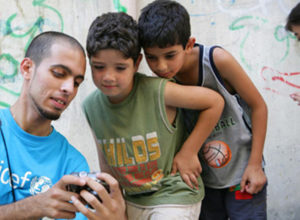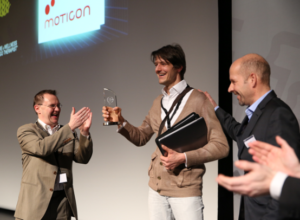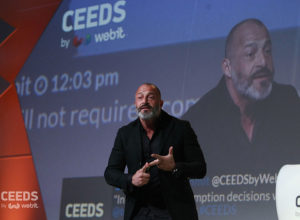Incorporating Storytelling into Brand’s Social Media Strategy
Children are looking forward to bedtime stories every night, aren’t they? In order to capture not only children’s, but also adults’ attention you need a good story. Sounds pretty simple, but it is not. Much like a child at story time, stakeholders respond to well-planned strategic stories.
Every company has a story to tell, but how they tell it is what makes the difference. The ultimate question comes down to – how do you deliver a memorable story? For better or worse, there is not a single piece of advice that works anytime. What business needs is creativity, for sure, but it is not only this.
Here are some tips and tricks how to implement a good story in your strategy:
1. Create a Character
Forbes’ Susan Gurnelius says that characters your online audience can root for (or against) are a hallmark of a brand story online. Creating a character which embodies the ideals your company stands for can allow you to present a consistent narrative across platforms. Pay attention to the process of creating a character, because this is going to be what the name of your company is associated with. The character can lift you up, as well as it can bring you down for seconds.
2. Use Visuals in the Communication of Your Story
Through the use of infographics, videos and pictures, a company is better able to hold an audience’s attention to communicate its story. Have in mind, that approximately 65% of the population learns visually, according to the Visual Teaching Alliance.
3. Humanize the Brand to Become More Relevant
Every company has the opportunity to tell its brand story through various communication channels, but the story becomes more compelling when the brand incorporates a human element. Stakeholders are attracted to the people behind the brand and their day-to-day lives within a company.
The Global Webit Congress 2014 is sold out. We have opened a waiting list and a limited number of people shall be provided with the opportunity to buy their tickets online. In case of interest to join the Global Webit Congress 2014 – please sign in the waiting list.The Global Webit Congress 2014 is sold out. We have opened a waiting list and a limited number of people shall be provided with the opportunity to buy their tickets online. In case of interest to join the Global Webit Congress 2014 – please sign in the waiting list.
Jim Rosenberg: How a Nonprofit uses Digital
Have you ever put words nonprofit and digital together? Jim Rosenberg from UNICEF does it perfectly. His areas of expertise include social media marketing, strategy and issue management, content strategy and governance, as well as team building and leadership.
Jim is UNICEF's Chief of Digital Strategy, responsible for content strategy, content marketing, and overall approach for video, photo, social media, and multi-platform/mobile web. In 2014 he was named by the Guardian as a global development tweeter to watch.
 Previously, as the World Bank's Head of Online & Social Media, Jim played a key role to create a coherent, global approach to digital communications, integrating digital into all facets of the Bank's outreach. Jim led the team tasked with corporate web & social media efforts including content strategy, reputation management, innovation, rapid response, and campaigns in Arabic, Chinese, English, French, Russian and Spanish.
At the World Bank Group, Jim was also a regional web editor covering South Asia and for four years managed outreach for CGAP's mobile phone banking/microfinance program, working closely with key players from the fields of retail finance, mobile telecom, and regulatory agencies.
As a journalist, Jim was a business reporter for WAMU-FM, "Marketplace," and a producer for the Australian Broadcasting Corporation and XM Satellite Radio. He holds a master's in Journalism from Columbia University in New York City, where since 2011 he has served as a member of the Alumni Board.
If you need an inspiration, you definitely have to meet Jim. Do it at the 6th Global Webit Congress in Istanbul.
The Global Webit Congress 2014 is sold out. We have opened a waiting list and a limited number of people shall be provided with the opportunity to buy their tickets online. In case of interest to join the Global Webit Congress 2014 - please sign in the waiting list.
Previously, as the World Bank's Head of Online & Social Media, Jim played a key role to create a coherent, global approach to digital communications, integrating digital into all facets of the Bank's outreach. Jim led the team tasked with corporate web & social media efforts including content strategy, reputation management, innovation, rapid response, and campaigns in Arabic, Chinese, English, French, Russian and Spanish.
At the World Bank Group, Jim was also a regional web editor covering South Asia and for four years managed outreach for CGAP's mobile phone banking/microfinance program, working closely with key players from the fields of retail finance, mobile telecom, and regulatory agencies.
As a journalist, Jim was a business reporter for WAMU-FM, "Marketplace," and a producer for the Australian Broadcasting Corporation and XM Satellite Radio. He holds a master's in Journalism from Columbia University in New York City, where since 2011 he has served as a member of the Alumni Board.
If you need an inspiration, you definitely have to meet Jim. Do it at the 6th Global Webit Congress in Istanbul.
The Global Webit Congress 2014 is sold out. We have opened a waiting list and a limited number of people shall be provided with the opportunity to buy their tickets online. In case of interest to join the Global Webit Congress 2014 - please sign in the waiting list.
 Previously, as the World Bank's Head of Online & Social Media, Jim played a key role to create a coherent, global approach to digital communications, integrating digital into all facets of the Bank's outreach. Jim led the team tasked with corporate web & social media efforts including content strategy, reputation management, innovation, rapid response, and campaigns in Arabic, Chinese, English, French, Russian and Spanish.
At the World Bank Group, Jim was also a regional web editor covering South Asia and for four years managed outreach for CGAP's mobile phone banking/microfinance program, working closely with key players from the fields of retail finance, mobile telecom, and regulatory agencies.
As a journalist, Jim was a business reporter for WAMU-FM, "Marketplace," and a producer for the Australian Broadcasting Corporation and XM Satellite Radio. He holds a master's in Journalism from Columbia University in New York City, where since 2011 he has served as a member of the Alumni Board.
If you need an inspiration, you definitely have to meet Jim. Do it at the 6th Global Webit Congress in Istanbul.
The Global Webit Congress 2014 is sold out. We have opened a waiting list and a limited number of people shall be provided with the opportunity to buy their tickets online. In case of interest to join the Global Webit Congress 2014 - please sign in the waiting list.
Previously, as the World Bank's Head of Online & Social Media, Jim played a key role to create a coherent, global approach to digital communications, integrating digital into all facets of the Bank's outreach. Jim led the team tasked with corporate web & social media efforts including content strategy, reputation management, innovation, rapid response, and campaigns in Arabic, Chinese, English, French, Russian and Spanish.
At the World Bank Group, Jim was also a regional web editor covering South Asia and for four years managed outreach for CGAP's mobile phone banking/microfinance program, working closely with key players from the fields of retail finance, mobile telecom, and regulatory agencies.
As a journalist, Jim was a business reporter for WAMU-FM, "Marketplace," and a producer for the Australian Broadcasting Corporation and XM Satellite Radio. He holds a master's in Journalism from Columbia University in New York City, where since 2011 he has served as a member of the Alumni Board.
If you need an inspiration, you definitely have to meet Jim. Do it at the 6th Global Webit Congress in Istanbul.
The Global Webit Congress 2014 is sold out. We have opened a waiting list and a limited number of people shall be provided with the opportunity to buy their tickets online. In case of interest to join the Global Webit Congress 2014 - please sign in the waiting list. Wearable Tech and HealthCare
Wearable Tech is finding all kind of uses in different sectors. One sector that will see many future uses for wearable devices is Healthcare. Healthcare is a sector that is constantly searching and employing new technologies. The challenges for better life outcomes are numerous. Our health matters and that is why researchers are looking for newer ways to improve the quality of life by employing wearable devices.
One such example of technology that is improving our lifestyles and healthier outcomes is the OpenGo sensor insole used in rehab monitoring. A unique product developed by Moticon that won the 2014 International Wearable Technologies Innovation World cup.
The OpenGo sensor insole is used for impact analysis after leg surgery or for the optimization of the motion sequence of a professional athlete.
The insole can measure distribution of pressure, acceleration and motion sequences, thanks to its flexibility and its thin structure.
Even the approximate temperature of the foot can be measured. It has 13 worldwide unique, capacitive pressure sensors as well as a 3D acceleration sensor and a temperature sensor for the collection of data integrated in the insole.
An integrated storage records the measured data, which is then transmitted directly via the ANT+ enabled USB flash drive.
The entire technology is in the insole itself – there is no need for wires or bulky additional devices.
To find out more about this great wearable device and the fantastic uses it will have in healthcare join our speaker, Moticon's CEO, Dr. Maximilian Müller at the blue track of the Global Webit Congress. Book your ticket now.
Spotify at Webit: “Music is a reflection of our life”
 As Head of Spotify Labs, Gary Liu studies industry intelligence and trends to identify emerging technologies and platforms, and test new business strategies for Spotify. Previously, he was Spotify's Global Director of Ad Product Strategy, leading platform innovation and operations for ads, and working with agencies and brands around the world to activate unique media programs. Gary joined Spotify from AOL, where he was the Director of Sales Strategy and Operations at Patch. In his role, Gary led the revenue strategy, sales operations, and ads infrastructure teams. Prior to joining AOL, Gary was a business and sales operations leader at both Clickable (a venture-funded NYC startup) and Google.
Born in California, Gary grew up in Taiwan and New Zealand, but has called the US Northeast his home for the past 17 years. He now lives in New York City with his wife Katrina, a pediatric dentist, 2 cats, and a dog. Ironically, he is extremely allergic to animals, and deathly afraid of dentists. Gary holds a BA in Economics from Harvard University.
One of Gary's defining Music Moments was his first game at Yankee Stadium, where he was introduced to "Baba O'Riley" by The Who. Subsequently, Gary spent two weeks listening to classic rock radio armed with a dictaphone, waiting for the song to be played. Eventually, Gary was able to catch the song on tape (piracy) and then used the recording as his alarm clock throughout high school.
This is not Gary’s first appearance on Webit stage. He was a speaker at the previous edition of Global Webit Congress when he presented interesting researches regarding music’s meaning in our lives. 107 minutes a day per user is the average time spent on Spotify. Consumers contextualize music with moments and business should have this in mind in order to implement it right.
Gary presented 3 easy steps to create a meaningful musical identity:
As Head of Spotify Labs, Gary Liu studies industry intelligence and trends to identify emerging technologies and platforms, and test new business strategies for Spotify. Previously, he was Spotify's Global Director of Ad Product Strategy, leading platform innovation and operations for ads, and working with agencies and brands around the world to activate unique media programs. Gary joined Spotify from AOL, where he was the Director of Sales Strategy and Operations at Patch. In his role, Gary led the revenue strategy, sales operations, and ads infrastructure teams. Prior to joining AOL, Gary was a business and sales operations leader at both Clickable (a venture-funded NYC startup) and Google.
Born in California, Gary grew up in Taiwan and New Zealand, but has called the US Northeast his home for the past 17 years. He now lives in New York City with his wife Katrina, a pediatric dentist, 2 cats, and a dog. Ironically, he is extremely allergic to animals, and deathly afraid of dentists. Gary holds a BA in Economics from Harvard University.
One of Gary's defining Music Moments was his first game at Yankee Stadium, where he was introduced to "Baba O'Riley" by The Who. Subsequently, Gary spent two weeks listening to classic rock radio armed with a dictaphone, waiting for the song to be played. Eventually, Gary was able to catch the song on tape (piracy) and then used the recording as his alarm clock throughout high school.
This is not Gary’s first appearance on Webit stage. He was a speaker at the previous edition of Global Webit Congress when he presented interesting researches regarding music’s meaning in our lives. 107 minutes a day per user is the average time spent on Spotify. Consumers contextualize music with moments and business should have this in mind in order to implement it right.
Gary presented 3 easy steps to create a meaningful musical identity:
- Identify your audience and own a moment, an emotion, or an activity
- Have an opinion about great music, into the context of your idenitity
- Become a taste-maker and change the conversation about music
Big Data for retailers and competitive intelligence
Competitor intelligence is a specific type of market intelligence. As a result, a good quality provider of market intelligence should offer competitor intelligence as part of its range of services.
According to the definition, we found in Wikipedia, competitive intelligence as:
‘The action of defining, gathering, analyzing, and distributing intelligence about products, customers, competitors, and any aspect of the environment needed to support executives and managers making strategic decisions for an organization’.Literally, it means to know what is going outside of your business, in order for you and your products to be competitive and relevant to the market. It is inevitable when talking about retailers and competitive intelligence, not to talk about big data. And it is not just big, but it gets bigger every single day. The question here is if retailers could control the data gathering and how to manage the whole process. The truth is that there is more information available to the business than ever before. However, information that can really help a business make decisions is scarce and valuable. So you should pick and gather preferably. It is extremely difficult to measure the ROI of market intelligence, respectively of customer intelligence; nevertheless, it is clear that the price of projects broadly reflect the potential benefits. The most expensive studies are market entry intelligence studies, on the basis of which huge investments are often made (or avoided). 10 days left till the 6th Global Webit Congress in Turkey. Our speakers have prepared plenty of good practices for you, so book your tickets now!
Igor Beuker: "What Webit has achieved is phenomenal in my eyes"
Igor Beuker is one of Europe’s most wanted professional speakers, valued as one of the leading independent and outspoken voices on emerging trends, brands, marketing, media and disruptive innovations. Igor delivered 412 keynote speeches in 42 countries and fired up events like Google Zeitgeist, IAA, Ad Tech, Social Media World Forum, Social Marketers Summit, IAB Europe and WPP Stream. Audiences around the globe have rated Igor’s stories as thought provoking, refreshing and inspiring: "the true rockstar of pro speakers".
Today we're speaking with him about the emotion to apply for a Webit speaker, to be amongst the Audience winner and what could we expect from him on the stage of Webit.
- Are you excited that you are among the winners at audience award to be on the stage of GWC so 10 000 visitors from EMEA and ASIA will be able to hear your thoughts and you will share your experience with them?
Very excited since I feel that Webit is a true power brand in events. I’d like to compare it to playing Champions League. And being elected in a contest by the audience is an extra ‘kick’ indeed.- During the contest they were really big names in the digital and tech industry worldwide so what was the feeling to compete?
Really big names, so I felt very happy and a bit proud. However, I’ve been pro speaker for 12 years and have been doing 412 keynotes around the world so far at many great events. But not on Webit yet. So trust me, I was highly motivated to be part of your line-up ;-)- What was your motivation to apply for a speaker at Webit and What are your expectations from the 6th Webit Global Congress?
What Webite has achieved is phenomenal in my eyes. It was a bucket list thing. I needed to speak here as well.- We have more than 300 media from all around the world there that are very curious for news and launches so please share with us in before just a part of your topic so to keep it hot..:)
I will give insights into the largest advertising pitch in the world. How the $ 5 billion account global account Unilever was won with big-data, adaptive media modelling and predictive marketing. A scoop to the world with many actionable insights.- Who would you advise to attend Webit Global Congress and why?
Exponential technologies will disrupt all industries. So I would recommend everybody in the C-level suite to come to Webit. Hurry up and book your Webit tickets now!Digital Commerce – Personalization Startegies
78 percent of consumers would buy from a retailer more frequently if they received personalized offers and 71 percent don’t believe retailers are effectively providing these offers. These results we can find in an August 2013 Retail Touch Points article. More than 50 percent of online retailers agree that personalization is fundamental to their online strategy, still personalization tactics are often implemented without an established personalization strategy.
One of the biggest advantages of Internet marketing is the ability to personalize the user experience. Here are three personalization strategies from three multichannel merchants:
Personalization is just a fancy name for segmentation
Personalization is just a fancy name for segmentation, according to Andrew Knight, manager of online user experience at big-box hardware retailer The Home Depot.“Personalization starts with customer registration; that’s where we get a lot of the segmentation data for personalization efforts,” he said.Personalization then can address anything from customer geographic location to contact preference. What you need to do is to make the customer to provide the necessary data.
Use the customer life cycle as a personalization tool
For David’s Bridal, a marketer of wedding dresses and accessories, the wedding time line is the most important part of the segmentation strategy. Marketing messages are timed to what a bride might need or should have whether she’s six months or six weeks from her wedding date. Knowing the life cycle of your products means knowing what customers need.Watch for and anticipate purchase triggers
More than just life cycle marketing, watching for purchase triggers requires an in-depth analysis of what products your customers buy following other purchases.“Whenever a purchase is made, either over the phone or on the Web, it starts a communication strategy based on certain purchase details,” noted David Manela, vice president of strategy and business development at Vivre, a multichannel merchant of luxury apparel and home furnishings. “If [customers] buy a particular brand of dress, we know they’re likely to purchase another specific product in a couple of weeks. We try to anticipate and trigger that purchase with an e-mail.”Personalization make customers special and they can feel it, they are looking forward to it. To learn more personalization strategies and share your own experience, come at Webit. Time is ticking away, only two week are left, so hurry up and book your tickets now.
Pete Blackshaw: Satisfied Customers Tell Three Friends, Angry Customers Tell 3000
Pete Blackshaw is Global Head of Digital Marketing and Social Media for Nestlé, S.A. Pete’s career, spanning digital marketing, public policy and brand management, has always put the consumer’s voice at the center.
Before Nestlé, Pete was the CMO of NM Incite, a joint venture between Nielsen and McKinsey that integrated social insight into core business strategies.
In his book “Satisfied Customers Tell Three Friends, Angry Customers Tell 3000: Running a Business in Today’s Consumer-Driven World” (Doubleday) Pete shares hundreds of experiences with Fortune 1000 companies working to improve the consumer conversation. While at P&G, he helped lead the company to Ad Age’s “1999 Interactive Marketer of the Year” distinction.
‘Pete is truly the Godfather of Consumer-Generated Media,’ says Jay Rampuria, Global Head of Client Development.He recently served as chairman of the board of the National Council of Better Business Bureaus and co-founded the Word-of-Mouth Marketing Association (WOMMA). An Advertising Research Foundation (ARF) “Great Minds” award winner, Pete is a graduate of Harvard Business School and the University of California, Santa Cruz. Less than two weeks left till the 6th Global Webit Congress where you can meet Pete Blackshaw. Book your tickets now!
Digital Commerce – Omni-channel solutions
It expands at any moment, so it is pointless to try to give definition for omni-channel. Marketo, one of the leading Marketing Automation providers gives a solid explanation of why marketers need to think Omni-Channel:
"Marketers now need to provide a seamless experience, regardless of channel or device. Consumers can now engage with a company in a physical store, on an online website or mobile app, through a catalog, or through social media. They can access products and services by calling a company on the phone, by using an app on their mobile smartphone, or with a tablet, a laptop, or a desktop computer. Each piece of the consumer's experience should be consistent and complementary."Omni-channel provides the customers with multi-path purchase experience. In order to be recognizable on the market, you need to be everywhere and today, market is an aggregate concept. From their smartphone to the desktop to an in store visit; we are entering an omni-channel world, where consumers seek an omni-channel experience. Digital selling and omni-channel commerce have transformed the way customers shop as well as the way retailers engage with them. Store associates today are expected to deliver a customer experience that is as engaging, informative and profitable as it is accurate and efficient. To do this, they must have the ability to see a complete, omni-channel view of the customer, sell any unit of inventory across the entire retail network, and effortlessly handle cross channel transactions, such as returns and exchanges. Omni-channel is a way of thinking and the sooner you implement it, the more successful your business will be. Join the 6th Global Webit Congress to learn more about omni-channel solutions from digital experts. Book your tickets now!








